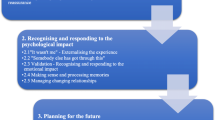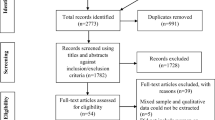Abstract
To identify factors that women who have recovered from postnatal depression consider to be important in the recovery process and to measure the consensus among recovered women regarding the importance of those factors. A two-panel, three-round adapted Delphi exercise supplemented by a user-led interpretation work-shop. Panel one consisted of ten women who had been treated by a health visitor for and recovered from postnatal depression. Panel two consisted of 158 women who had recovered from postnatal depression who were London based members of a national support group for postnatal depression. There was a strong consensus among the participants about the 37 success factors that were identified. Factors that were identified as ‘essential’ in recovery from postnatal depression included: emotional support from partner; sleep; improved communication with partner; the diagnosis; practical support from partner; emotional support from friends; time to bond with the new baby; and prompt assessment by a health visitor. An interpretation group, made up of seven women who had recovered from postnatal depression, condensed the 37 factors into seven categories: diagnosis; positive action (or reaction) to intervene in the recognized problem; provision of support by people you know; professional or outside agency input; relationship between mother and baby; returning to work and continuity of care. There was a strong level of consensus among recovered women regarding a wide range of recovery factors. While all of the factors were considered to be, at least, ‘important’, social support from family and friends was generally rated more highly than support from health care professionals.
Similar content being viewed by others
References
Anthony WA (1993) Recovery from mental illness: the guiding vision of the mental health service system in the 1990’s. Psychosoc Rehabil J 16:11–23
Appleby L, Warner R, Whitton A, Faragher B (1997) A controlled study of fluoxetine and cognitive–behavioural counselling in the treatment of postnatal depression. Brit Med J 314:932–936
Brugha TS, Sharp HM, Cooper SA, Wisender C, Britto D, Shinkwin R et al (1998) The Leicester 500 Project. Social support systems and the development of postnatal depressive symptoms, a prospective cohort study. Psychol Med 28:63–79
Cooper PJ, Murray L, Wilson A, Romaniuk H (2003) Controlled trial of the short- and long-term effect of psychological treatment of post-partum depression. Impact on maternal mood. Br J Psychiatry 182:421–429
Cornish E (1977) The study of the future. World Future Society, Washington, DC
Fiander M, Burns T (1998) Essential components in schizophrenia care: a Delphi approach. Acta Psychiat Scand 98:400–405
Hiscock H, Wake M (2001) Infant sleep problems and postnatal depression: a community based study. Pediatrics 107:1317–1322
Holden J, Sakovsky R, Cox J (1989) Counselling in a general practice setting: a controlled study of health visitor intervention in treatment of postnatal depression. Brit Med J 298:223–226
Marshall M, Lockwood A, Lewis S, Fiander M (2004) Essential elements of an early intervention service for psychosis: the opinions of expert clinicians. BMC Psychiatry 4:17
Misri S, Kostaras X, Fox D, Kostaras D (2000) Impact of partner support in the treatment of postpartum depression. Can J Psychiat 45:554–558
NICE (2007) Antenatal and postnatal mental health. The NICE guideline on clinical management and service guidance. NICE Clinical Guideline 45. National Institute for Health and Clinical Excellence, London
O’Hara M (1986) Social support life events and depression during pregnancy and the puerperium. Arch Gen Psychiat 43:569–573
Perkins R (2001) What constitutes success? The relative priority of service users’ and clinicians’ views of mental health services. Br J Psychiatry 179:9–10
Righetti-Veltema M, Conne-Perreard E, Bousquet A, Manzano J (1998) Risk factors and predictive signs of postpartum depression. J Affect Disorders 49(3):167–180
Rolls C, Cutts D (2001) Pregnancy-to-parenting education: creating a new approach. Birth Issues 10(2):53–58/60
Scheff TJ (1996) Being mentally ill: a sociological theory. Aldine, Chicago
Schmied V, Myors K, Wills J, Cooke M (2002) Preparing expectant couples for new parent experiences: a comparison of two models of antenatal education. J Perinat Educ 11:20–27
Sheppard M (1994) Childcare, social support and maternal depression: a review and application of findings. Brit J Soc Work 24:287–310
Whitton A, Warner R, Appleby L (1996) The pathway to care in postnatal depression: women’s attitudes to postnatal depression and its treatment. Brit J Gen Pract 46:427–428
Acknowledgements
The study was funded by the NHS Executive London Regional Office.
Author information
Authors and Affiliations
Corresponding author
Rights and permissions
About this article
Cite this article
Di Mascio, V., Kent, A., Fiander, M. et al. Recovery from postnatal depression: a consumer’s perspective. Arch Womens Ment Health 11, 253–257 (2008). https://doi.org/10.1007/s00737-008-0024-7
Received:
Accepted:
Published:
Issue Date:
DOI: https://doi.org/10.1007/s00737-008-0024-7




